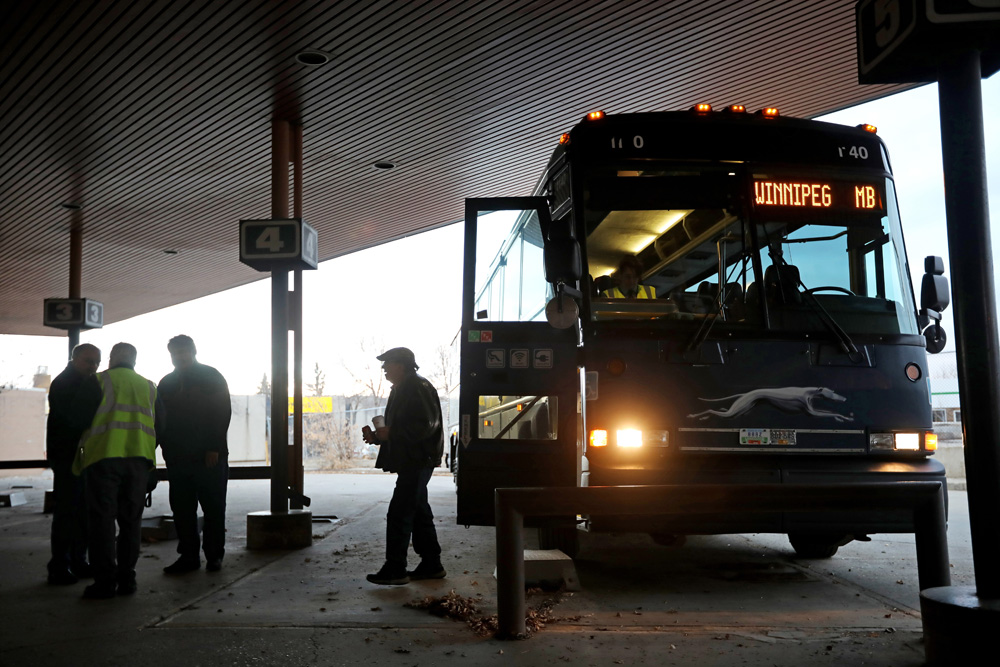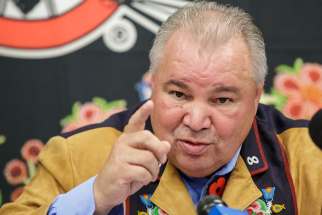Manitoba shrugs off feds’ bus-service rescue plan
Read this article for free:
or
Already have an account? Log in here »
To continue reading, please subscribe:
Monthly Digital Subscription
$0 for the first 4 weeks*
- Enjoy unlimited reading on winnipegfreepress.com
- Read the E-Edition, our digital replica newspaper
- Access News Break, our award-winning app
- Play interactive puzzles
*No charge for 4 weeks then price increases to the regular rate of $19.00 plus GST every four weeks. Offer available to new and qualified returning subscribers only. Cancel any time.
Monthly Digital Subscription
$4.75/week*
- Enjoy unlimited reading on winnipegfreepress.com
- Read the E-Edition, our digital replica newspaper
- Access News Break, our award-winning app
- Play interactive puzzles
*Billed as $19 plus GST every four weeks. Cancel any time.
To continue reading, please subscribe:
Add Free Press access to your Brandon Sun subscription for only an additional
$1 for the first 4 weeks*
*Your next subscription payment will increase by $1.00 and you will be charged $16.99 plus GST for four weeks. After four weeks, your payment will increase to $23.99 plus GST every four weeks.
Read unlimited articles for free today:
or
Already have an account? Log in here »
Hey there, time traveller!
This article was published 31/10/2018 (2601 days ago), so information in it may no longer be current.
OTTAWA — The federal government has outlined a cost-sharing plan to help isolated communities that will be without bus service following Greyhound’s decision to scrap much of its business as of Oct. 31; but Manitoba has signalled it might not be interested.
Greyhound service a tie that binds blind Winnipeg woman, rural family
Without the Greyhound bus, Deanna Ng is worried she may not be able to visit her elderly parents in Minnedosa.
Without the Greyhound bus, Deanna Ng is worried she may not be able to visit her elderly parents in Minnedosa.
The legally blind 34-year-old Winnipeg woman tries to make the 2½-hour bus trip once a month.
Last month her parents made the drive to Winnipeg for Thanksgiving.
Her mom, 60, cares for her stepfather, 81, who has dementia. As winter closes in, the likelihood her parents can make the drive on icy roads is too much to expect.
Wednesday’s end of Greyhound bus service on the Prairies has left many customers — people who can’t afford their own cars, are disabled or are ailing and must travel to Winnipeg for medical care — wondering how they will get where they need to go.
“Are there other transit service going to take up where Greyhound left off?” she said. “I hear the price will be more expensive and I have a low income. I don’t know what I’ll do.”
Ng and her sister both live in Winnipeg but the family is close and the sisters try to make it home regularly.
“Visiting is very important to us and a lot of them (other relatives) don’t have the means to drive to the city. Plus the city traffic is very intimidating,” she said, adding the situation has left her feeling anxious.
“I’m disappointed in the bus system and I’m not sure what I’ll do for Christmas and that’s really important — to be with my family at that time of year.”
—Alexandra Paul
“We have seen significant progress and commercial interest in these routes,” Transport Minister Marc Garneau told reporters Wednesday. “Some of them will start in the weeks to come.”
Greyhound announced on July 9 it would end service on all but one of its routes in Western Canada, and in northern Ontario, effective Oct. 31.
Ottawa waited 114 days, until the eve of Greyhound’s pullout, to announce a program in which the federal and provincial governments would split the cost of subsidizing routes that haven’t been filled by the private market, for a maximum of two years.
The government will also financially support start-up transportation companies in Indigenous communities through business development programs already in place.
Garneau said he has an idea of how much the measures would cost, but he refused to reveal it.
His department said a provincial working group is still figuring out “the specific details of this approach” and thus the cost.
A month ago, Garneau rejected Manitoba’s proposal that the federal government pay Greyhound to extend service by at least 60 days, to allow other businesses to take over.
On Wednesday, Garneau said 87 per cent of stops Greyhound used to serve have had a private-sector replacement step in.

“We want to encourage new companies that are ready to step forward,” he said. “This is a very encouraging result.”
Manitoba Infrastructure Minister Ron Schuler suggested it’s unlikely Manitoba will take up the cost-sharing offer: “We as a government are not prepared to get into the business of running buses; we believe the market will make a decision on what’s feasible.”
He said Manitoba was only informed about Garneau’s announcement a few hours before he made it.
“One of the concerns we have with the federal government is they like to leave everything to the last minute,” he said.
Tory MP Larry Maguire said that follows a trend where Ottawa sees Manitoba as an afterthought. “We’ve certainly seen a deterioration in that relationship,” said the Brandon-area MP.
Greyhound won’t leave reserves stranded, Ottawa says
Indigenous Services Minister Jane Philpott said the federal government will continue its on-reserve healthcare arrangements, which has Ottawa pay to send patients to Winnipeg for advanced treatment.
“There should be minimal to no disruption on this front,” said Philpott, whose office said there are contingency plans such as boats and flights for on-reserve patients who won’t have access to bus services.
The National Inquiry into Missing and Murdered Indigenous Women and Girls said in July it was “deeply concerned” by the pullout. Philpott’s office noted Wednesday that the on-reserve health plan will pay to send a domestic-abuse victim out of the community if their shelter does not offer such transportation.
—Dylan Robertson
Multiple federal sources said Manitoba has been part of the inter-provincial talks for months, and that at least the province’s senior bureaucrats would have known what was coming days in advance.
The sources said Manitoba provided the list of unserved communities and that Ottawa had outlined the maximum federal subsidy for each route.
At least five companies have emerged to replace passenger, freight and medical transportation for communities across the province, mostly with large vans instead of huge coaches. Some offer far less service than what the province compelled Greyhound to operate through its licensing agreement.
The province said remaining gaps include a connection between Minnedosa and the Saskatchewan border, and Highway 10 from The Pas to Flin Flon. Maguire said Ottawa ought to have helped cities such as Thompson, which contracted its city bus services to Greyhound and wasn’t able to secure a replacement for at least two weeks.
Garneau said the working group will develop a “long-term plan to address mobility issues across the entire country, not just the West.”
The Federation of Canadian Municipalities said it supported Ottawa forming a provincial working group, but its head, Vicki-May Hamm, said “addressing this issue will require municipal government consultations in the design of any new programs or legislation.”
dylan.robertson@freepress.mb.ca











.jpg?h=215)


